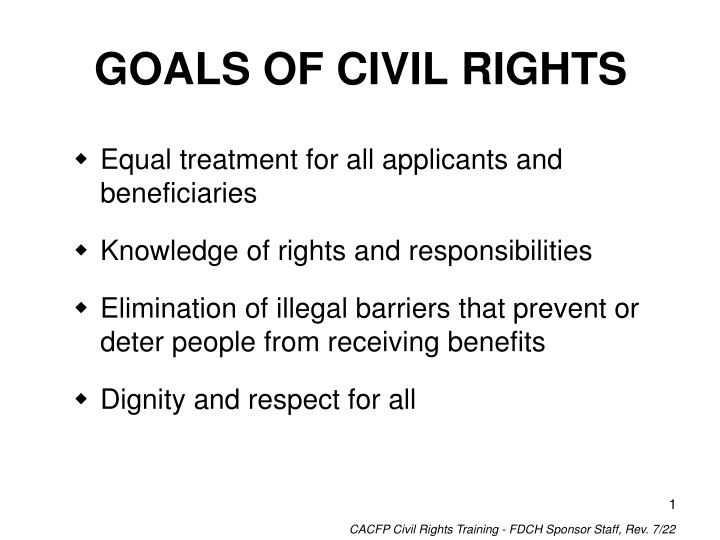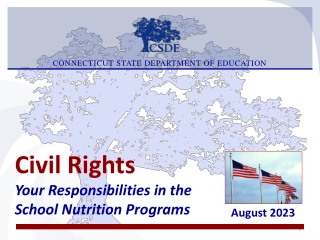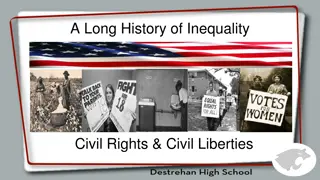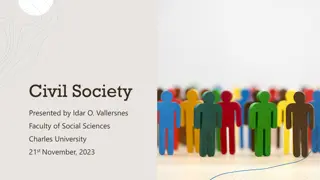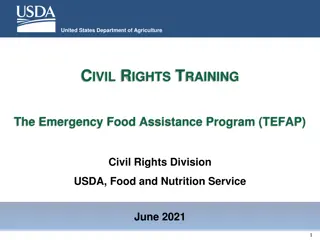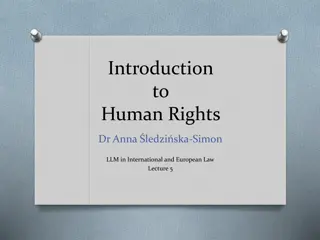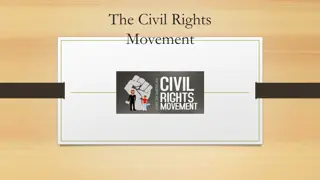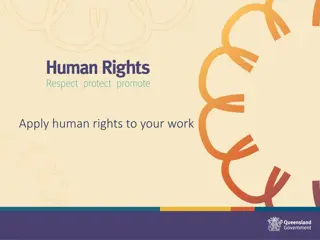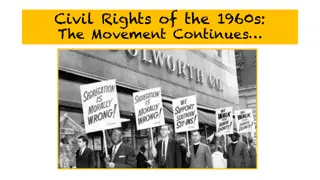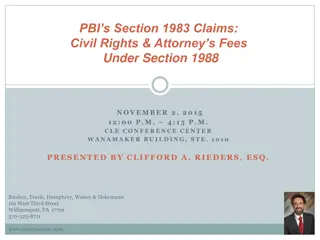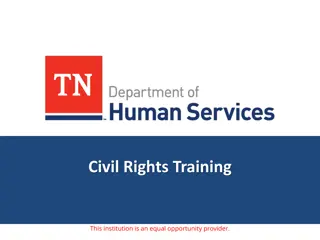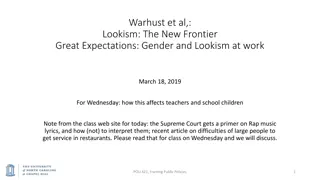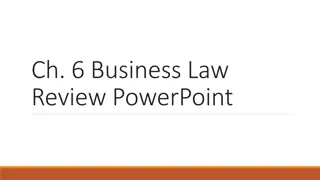GOALS OF CIVIL RIGHTS
Civil rights training in the CACFP program focuses on achieving equal treatment, knowledge of rights, and elimination of barriers. Understand discrimination, protected classes, the four Ds of discrimination, examples of discrimination, and components of civil rights compliance to ensure equal access for all participants.
Download Presentation

Please find below an Image/Link to download the presentation.
The content on the website is provided AS IS for your information and personal use only. It may not be sold, licensed, or shared on other websites without obtaining consent from the author.If you encounter any issues during the download, it is possible that the publisher has removed the file from their server.
You are allowed to download the files provided on this website for personal or commercial use, subject to the condition that they are used lawfully. All files are the property of their respective owners.
The content on the website is provided AS IS for your information and personal use only. It may not be sold, licensed, or shared on other websites without obtaining consent from the author.
E N D
Presentation Transcript
GOALS OF CIVIL RIGHTS Equal treatment for all applicants and beneficiaries Knowledge of rights and responsibilities Elimination of illegal barriers that prevent or deter people from receiving benefits Dignity and respect for all 1 CACFP Civil Rights Training - FDCH Sponsor Staff, Rev. 7/22
What is Discrimination? The act of distinguishing one person or group of persons from other, either intentionally, by neglect, or by the effect of actions or lack of actions based on their protected classes. What Is a Protected Class? Any person or group of people who have characteristics for which discrimination is prohibited based on a law, regulation, or executive order. 2 CACFP Civil Rights Training - FDCH Sponsor Staff, Rev. 7/22
Discrimination = Four Ds an individual or group is: Denied benefits or services that other receive Delayed receiving benefits or services that others receive Treated Differently than others to their disadvantage Given Disparate treatment something which does not seem discriminatory, but has a discriminatory impact in practice 3 CACFP Civil Rights Training - FDCH Sponsor Staff, Rev. 7/22
Examples of Discrimination Refuse a child s enrollment based on disability Failure to provide reasonable accommodations to disabled individuals Serving meals at a time, place, or manner that is discriminatory Selectively distributing applications and income forms Failure to provide the same eligibility criteria to all children Failure to provide materials regarding CACFP in different translations, as needed 4 CACFP Civil Rights Training - FDCH Sponsor Staff, Rev. 7/22
Components of Civil Rights Compliance Public Notification System Outreach and Education Data Collection Reasonable Accommodations Language Assistance Civil Rights Complaint Procedures Technical Assistance and Training Customer Service Conflict Resolution 5 CACFP Civil Rights Training - FDCH Sponsor Staff, Rev. 7/22
Equal Access All participants who attend must be provided equal access to the benefits of the CACFP To withhold the program from any eligible age group is age discrimination Infants must be offered infant formula and food at the child care; parents cannot be asked or required to supply these items. 6 CACFP Civil Rights Training - FDCH Sponsor Staff, Rev. 7/22
Public Notification Must include information on: Eligibility Benefits & Services (i.e., free or reduced-price meals) Program availability Applicant rights and responsibilities Procedures for filing a complaint Nondiscrimination policies Any programmatic changes (i.e., changing location of a meal site) CACFP Civil Rights Training - FDCH Sponsor Staff, Rev. 7/22
Methods of Public Notification Public Release Issued by State Agency Informs the general public that your agency sponsors the CACFP and that meals are provided at no separate charge. Post And Justice for All Poster (required of sponsor only) Includes the USDA s required nondiscrimination statement and lists the USDA contact information for filing a complaint of discrimination. Other methods of public notification (optional): Bulletins Letters/Leaflets/Brochures Internet/Computer-based Applications CACFP Civil Rights Training - FDCH Sponsor Staff, Rev. 7/22
And Justice for All Poster All sponsors participating in Child Nutrition Programs must display the USDA s non- discrimination poster in a prominent area where participants and potential participants have access Examples: cafeteria/food service area, office, central bulletin board Must be posted in admin building/office Must be 11 x 17 format DPI provides posters to sponsors free of charge. Complete this order form to order additional posters, if needed. 9 CACFP Civil Rights Training - FDCH Sponsor Staff, Rev. 7/22
Public Notification System All FDCH sponsors participating in the CACFP must provide informational materials in the appropriate translation concerning the availability and nutritional benefits of the program News Media Release: DPI annually issues a statewide media release for all FDCH sponsors. 10 CACFP Civil Rights Training - FDCH Sponsor Staff, Rev. 7/22
Public Notification System Sponsors must: Providersmust: Post in visible location of home Give copies to providers AND/OR Give copies to families Sponsor contact info here: Agency name AR name Phone number Address Amanda S. Cullen, RDN, CD, Director Community Nutrition Programs Wisconsin Department of Public Instruction P.O. Box 7841 Madison, WI 53707-7841 608-267-9129 Located under Guidance Memo H on website CACFP Civil Rights Training - FDCH Sponsor Staff, Rev. 7/22 11
Outreach and Education Reach as many potential participants as possible Ensure program access Pay attention to under-represented groups Include the required nondiscrimination statement on all appropriate FNS and agency publications, web sites, posters, and informational materials When using graphics, reflect diversity and inclusion 12 CACFP Civil Rights Training - FDCH Sponsor Staff, Rev. 7/22
Nondiscrimination Statement (NDS) At a minimum, the full USDA Nondiscrimination Statement (NDS) must be on: Application form(s) for the CACFP Notification of eligibility or ineligibility of CACFP Notification of adverse action Program (Home) webpage (or a link to it) Public information, including program literature The full NDS is on the next slide. Agencies may copy and paste the full NDS from the document available under Guidance Memo H (http://dpi.wi.gov/community- nutrition/cacfp/guidance-memo) CACFP Civil Rights Training - FDCH Sponsor Staff, Rev. 7/22 13
Nondiscrimination Statement (5/22 revision) In accordance with federal civil rights law and U.S. Department of Agriculture (USDA) civil rights regulations and policies, this institution is prohibited from discriminating on the basis of race, color, national origin, sex (including gender identity and sexual orientation), disability, age, or reprisal or retaliation for prior civil rights activity. Program information may be made available in languages other than English. Persons with disabilities who require alternative means of communication to obtain program information (e.g., Braille, large print, audiotape, American Sign Language), should contact the responsible state or local agency that administers the program or USDA s TARGET Center at (202) 720-2600 (voice and TTY) or contact USDA through the Federal Relay Service at (800) 877-8339. To file a program discrimination complaint, a Complainant should complete a Form AD-3027, USDA Program Discrimination Complaint Form which can be obtained online at: https://www.usda.gov/sites/default/files/documents/USDA-OASCR%20P-Complaint-Form-0508-0002- 508-11-28-17Fax2Mail.pdf, from any USDA office, by calling (866) 632-9992, or by writing a letter addressed to USDA. The letter must contain the complainant s name, address, telephone number, and a written description of the alleged discriminatory action in sufficient detail to inform the Assistant Secretary for Civil Rights (ASCR) about the nature and date of an alleged civil rights violation. The completed AD- 3027 form or letter must be submitted to USDA by: 1. mail: U.S. Department of Agriculture Office of the Assistant Secretary for Civil Rights 1400 Independence Avenue, SW Washington, D.C. 20250-9410; or 2. fax: (833) 256-1665 or (202) 690-7442; or 3. email: program.intake@usda.gov This institution is an equal opportunity provider. 14 CACFP Civil Rights Training - FDCH Sponsor Staff, Rev. 7/22
Nondiscrimination Statement If the material or document is too small to permit the full statement (previous 2 slides) to be included, the material MUST, at a minimum, include: This institution is an equal opportunity provider. 15 CACFP Civil Rights Training - FDCH Sponsor Staff, Rev. 7/22
Collecting and Recording Participation Data Race and ethnicity data is used to determine how effectively your program is reaching potentially eligible children and where outreach may be needed. Establish a system to collect race and ethnicity data on an annual basis Program applicants may not be required to furnish race and ethnicity You may inform the household, however, that collection of this information is strictly for statistical reporting and has no influence on eligibility determination for the program. Data collectors may not second guess, change, or challenge a self-declaration of race and ethnicity made by a participant unless such declarations are blatantly false. 16 CACFP Civil Rights Training - FDCH Sponsor Staff, Rev. 7/22
Data Collecting and Reporting Collect ethnicity data first, then race data 1.Ethnicity categories: Hispanic or Latino Non-Hispanic or Non-Latino 2. Race categories (instructions should specify mark one or more ) American Indian or Alaskan Native Asian Black or African American Native Hawaiian or other Pacific Islander White 17 CACFP Civil Rights Training - FDCH Sponsor Staff, Rev. 7/22
Obtain race / ethnicity data through Voluntary self-identification or self-reporting USDA issued guidance that visual observation and identification is no longer an allowable practice in obtaining race and ethnicity from CACFP participants CACFP Enrollment Forms: The race and ethnicity data may be collected on the enrollment forms submitted to the sponsor If a household does not provide race and ethnicity information, use other documentation the sponsor collects that identifies the enrolled children s race and ethnicity data 18 CACFP Civil Rights Training - FDCH Sponsor Staff, Rev. 7/22
Sample Race and Ethnicity Data Form This data may be: Annually compiled by other means than this sample Race and Ethnicity Data Form. Collected and maintained within a database to annually compile into a printed report Located under Guidance Memo H on website: http://dpi.wi.gov/community- nutrition/cacfp/guidance-memo 19 CACFP Civil Rights Training - FDCH Sponsor Staff, Rev. 7/22
Data Management Collection systems must ensure that data collected/retained are: Collected and retained by each provider Kept secure and confidential Submitted, if requested, to FNS Regional or Headquarters Offices Kept on file for 3 years plus the current program year Identify all sources of information used 20 CACFP Civil Rights Training - FDCH Sponsor Staff, Rev. 7/22
Conflict Resolution The USDA recommends using an Alternative Dispute Resolution (ADR) program ADR Definition: use of a neutral third party (usually a person acting as a facilitator) to resolve informally a complaint of discrimination through use of various techniques such as fact finding, mediation, peer panels, facilitation, ombudsman support, or conciliation. For more information, visit: Federal Sector Alternative Dispute Resolution | U.S. Equal Employment Opportunity Commission (eeoc.gov) 21 CACFP Civil Rights Training - FDCH Sponsor Staff, Rev. 7/22
Reasonable Accommodations for Persons with Disabilities Providing Food Substitutions A disability is defined as any physical or mental impairment substantially limiting one or more major life activities , including digestion. This includes food allergies and intolerances. Programs are required to reasonably accommodate participants whose disabilities restrict their diets by providing substitutions or modifications for their meals, when supported by a proper medical statement The medical statement must: (1) Be from a licensed healthcare professional authorized to write medical prescriptions under Wisconsin law These are: Licensed Physicians; Physician Assistants; and Advanced Practice Nurse Prescribers (APNP) (2) Include a description of impairment (reason for request) and how to accommodate the impairment (e.g., food(s) to be avoided and recommended substitution(s)) 22
Language Assistance Limited English Proficiency (LEP) Definition: Individuals who do not speak English as their primary language and have limited ability to read, speak, write, or understand English. Recipients of Federal financial assistance have a responsibility to take reasonable steps to ensure meaningful access to their programs and activities by persons with LEP. 23 CACFP Civil Rights Training - FDCH Sponsor Staff, Rev. 7/22
Limited English Proficiency (LEP) Children should not be used as interpreters. Volunteers may be used, but make sure they understand interpreter ethics particularly confidentiality! Example: Sponsor staff with Spanish language skills could assist a household in completing a Household Size-Income Statement but would need to be trained on the importance of keeping all information received from the household confidential. 24 CACFP Civil Rights Training - FDCH Sponsor Staff, Rev. 7/22
Limited English Proficiency (LEP) See www.lep.gov for more information and resources Documents translated in Spanish and Hmong (Wisconsin specific forms): https://dpi.wi.gov/community-nutrition/cacfp/child- care/translations Household-Size Income Statement Forms in other languages (USDA Forms): https://www.fns.usda.gov/cacfp/english-meal-benefit- income-eligibility-form Note: the USDA document includes the various forms for all CACFP components; identify the appropriate form within the English version first to know which of the translated documents to give households. 25 CACFP Civil Rights Training - FDCH Sponsor Staff, Rev. 7/22
A shortage of resources does not eliminate the translation requirement Suggestions: Share resources to save money Use interpreter from another area Train bilingual staff to be interpreters Contact grassroots organizations to discuss translation or assistance from within the community Language line phone services may be available for a subscription fee through your local telephone service provider 26 CACFP Civil Rights Training - FDCH Sponsor Staff, Rev. 7/22
Right to File a Complaint Any person who believes they or someone they know has been discriminated against based on Federal protected classes (i.e, National origin, race, etc.) has a right to file a complaint within 180 days of the alleged discriminatory action. Complainants: Should complete the USDA Program Discrimination Complaint Form (AD-3027) Found online at: https://www.usda.gov/sites/default/files/documents/USDA- OASCR%20P-Complaint-Form-0508-0002-508-11-28- 17Fax2Mail.pdf May contact either of the following offices to submit a complaint: USDA- Office of the Assistant Secretary for Civil Rights: Refer to slide 14 for the address, fax number, and email address. Wisconsin DPI: Director, Community Nutrition Programs,125 South Webster Street, P.O. Box 7841, Madison, WI 53707- 7841, 608.267.9129 CACFP Civil Rights Training - FDCH Sponsor Staff, Rev. 7/22 27
Handling Civil Rights Complaints Complaints can be written or verbal Anonymous complaints should be handled as any other complaint All verbal or written complaints must be forwarded to WI DPI or USDA s Office of the Assistant Secretary for Civil Rights within three days of receiving a complaint Sponsors must give complainants a Civil Rights Complaint Form to complete (slide 27 has web link) Document all potential complaints in the Civil Rights Complaint Log Have a central location where the sponsor keeps completed Civil Rights Complaint Forms and the Civil Rights Complaint Log 28 CACFP Civil Rights Training - FDCH Sponsor Staff, Rev. 7/22
The following information should be included in a Civil Rights Complaint Name, address, phone number of complainant, if provided (not required) Specific name and location of entity delivering the benefit or service The nature of the incident, action, or method of administration that led the complainant to feel discriminated against 29 CACFP Civil Rights Training - FDCH Sponsor Staff, Rev. 7/22
The following information should be included in a Civil Rights Complaint (Continued) The basis on which the complainant feels discrimination exists [race, color, national origin, sex (including gender identity and sexual orientation), age, or disability] The names, titles, and business addresses of persons who may have knowledge of the discriminatory action The date(s) during which the alleged discriminatory actions occurred, or if continuing, the duration of such actions 30 CACFP Civil Rights Training - FDCH Sponsor Staff, Rev. 7/22
Civil Rights Training for Agency Staff All staff who work with the CACFP must receive training on all aspects of civil rights compliance annually Topics-What is Discrimination? -Collecting/recording racial/ethnic data -Where to display posters -What is a Civil Rights complaint -How to handle a Civil Rights complaint Use DPI s Civil Rights Training Power Point (Located under GM H > Civil Rights Training tab) Keep training records: List of staff who received training, when they received it, and training materials 31 CACFP Civil Rights Training - FDCH Sponsor Staff, Rev. 7/22
Customer Service All participants must be allowed equal opportunities to participate in Child Nutrition programs regardless of race, color, national origin, sex (including gender identity and sexual orientation), age, or disability All participants must be treated in the same manner (i.e., seating arrangements, serving lines, services and facilities, assignment of eating periods, methods of selection for Household Size-Income Statement approval) 32 CACFP Civil Rights Training - FDCH Sponsor Staff, Rev. 7/22
Understanding Differences: Respectful Language Put the person first Example:USE person with a disability , NOT disabled person Use culturally sensitive language Example: USE Asian , NOT Oriental Use inclusive/respectful terms Example: USE chair , NOT chairman The Side Road Business Communication: http://www.sideroad.com/Business_Communication/politically- correct-language.html 33 CACFP Civil Rights Training - FDCH Sponsor Staff, Rev. 7/22
Ask yourself each time you interact with participants How would I want to be addressed? Am I treating this person in the same manner I treat others? Have I informed this person exactly what information I need to make a determination on their Household Size-Income Statement? Have I given this person the opportunity to clarify all relevant factors or inconsistencies and ask questions? Have I provided this person with needed information to make necessary decisions? 34 CACFP Civil Rights Training - FDCH Sponsor Staff, Rev. 7/22
Civil Rights Must Do List Sponsors must train & monitor providers to ensure: The CACFP is provided in a nondiscriminatory manner Meals are offered to all children in care and meal substitutions are supplied to children with disabilities Providers supply formula and foods to infants, giving parents the option to supply only if they choose The Building for the Future flier is posted or given out to all families of enrolled children The current USDA nondiscrimination statement & complaint filing procedure is printed on materials available to the public which mention USDA and/or CACFP, including websites (sponsors & providers) 35 CACFP Civil Rights Training - FDCH Sponsor Staff, Rev. 7/22
Civil Rights Must Do List Sponsors must: Conspicuously place the And Justice for All poster within the sponsor s administrative office Annually compile Civil Rights Data and retain on file for 3 years plus the current year Provide informational materials in the appropriate translation concerning the availability and nutritional benefits of the CACFP Train staff annually on Civil Rights and retain training records Develop & fully implement your Civil Rights Complaint Procedure Make available to all staff: Civil Rights Complaint forms, Civil Rights Log and Civil Rights complaint procedure Refer all Civil Rights complaints to DPI or USDA 36 CACFP Civil Rights Training - FDCH Sponsor Staff, Rev. 7/22
